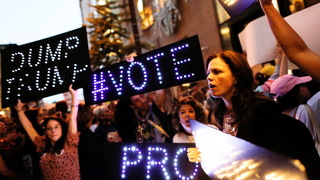
Related
Guests
- Nikole Hannah-Jonesaward-winning reporter covering racial injustice at The New York Times Magazine.
“If one studies history, this is not a surprising outcome,” award-winning racial justice reporter Nikole Hannah-Jones says about Donald Trump’s election win. She points to the Reconstruction era that followed President Abraham Lincoln’s assassination, and Richard Nixon’s use of the “Southern Strategy” to appeal to racial fears of white voters after President Lyndon Baines Johnson passed key civil rights measures. “Whenever there are great strides towards racial progress in this country, there is a white backlash.” She concludes, “There’s a lot of soul searching that needs to be done. But I also think this election is very American.”
Transcript
AMY GOODMAN: Nikole Hannah-Jones, we are going from the first African-American president in the United States to a president supported by the Ku Klux Klan. Your thoughts?
NIKOLE HANNAH-JONES: Well, I think if one studies history, this is not a surprising outcome. I’ve been tweeting about this all morning. Look at what happens after the Civil War, after Lincoln’s assassination. You get Grant, and then you get Hayes. And Hayes basically returns the white South to power and ends Reconstruction. You look at Lyndon B. Johnson, who of course passes and helps pass the most expansive civil rights legislation since Reconstruction, and we replace him in this country with Richard Nixon, who runs on a Southern strategy that plays on the racial fears of white Southerners and white ethnics in the North, and they quickly roll back and decide that they are not going to enforce key civil rights legislation. And now we have the first black president, and he gets replaced with someone who has been endorsed by white supremacists, white nationalists and the KKK. So, I think while a lot of people are reeling, I think that this is probably a very unsurprising outcome, when you look at history. Whenever there are great strides towards racial progress in this country, there is a white backlash, and we’re in the middle of that.
And I think the media coverage that is trying to call this an issue of working class, without saying “white working class,” when we know that black, Latino, brown working class did not vote for Donald Trump, is dishonest. I think also that we know that, at least from preliminary results, Trump won across the board with white voters, with educated white Americans, middle-class white Americans, that it was not just white folks who didn’t know any better. So I think there’s a lot of soul searching that needs to be done. But I also think that this election is very American.
AMY GOODMAN: What do you mean, American?
NIKOLE HANNAH-JONES: Like I just said: If you look at history, this is unsurprising. This has been a country that has never been comfortable with racial progress for ethnic and religious minorities, and still is not so.












Media Options